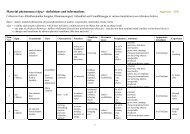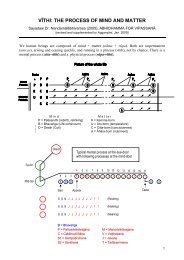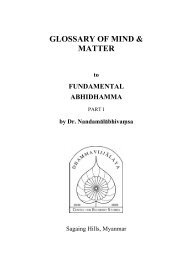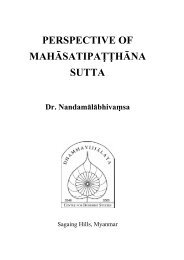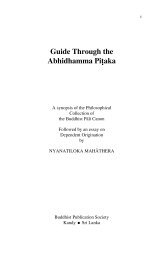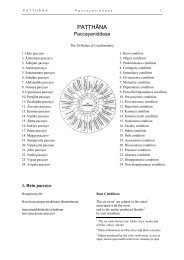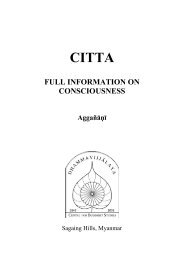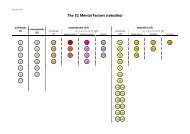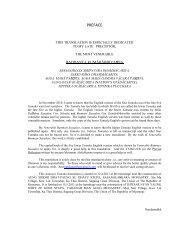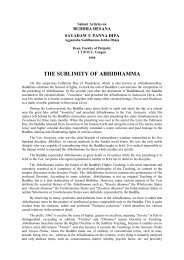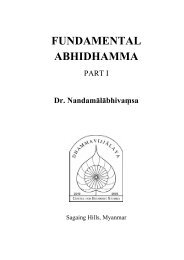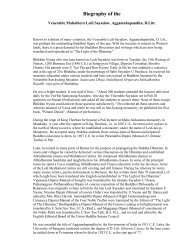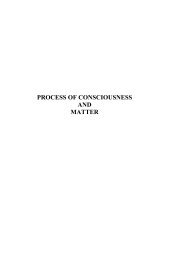ABHIDHAMMA IN DAILY LIFE - Abhidhamma.com
ABHIDHAMMA IN DAILY LIFE - Abhidhamma.com
ABHIDHAMMA IN DAILY LIFE - Abhidhamma.com
Create successful ePaper yourself
Turn your PDF publications into a flip-book with our unique Google optimized e-Paper software.
If you put in one viss of salt into the river, the taste of water remains unchanged. In the<br />
same way if you <strong>com</strong>mit a petty evil deed while you have accumulated many good kamma,<br />
the small evil deed will cause no noticeable ill effect. However, if you put one viss of salt<br />
into your pot, the water will go salty, in the same if you have accumulated only a few kusala<br />
(merit), a corresponding amount of evil will nullify your good kamma results.<br />
Wholesome kamma and Unwholesome kamma can counteract each other. A small evil can in no<br />
way hinder a large quantity of good kamma kusala. However, if you have only a small amount of<br />
wholesome kamma, a small evil will render your good kamma null and void. The moral lesson<br />
for the righteous is to do as many good deeds as possible and accumulate as much kusala as you<br />
can.<br />
7.2.12 Condition For Sufficiency: Prosperity (Sampatti)<br />
Condition For Deficiency: Misfortune (Vipatti)<br />
Throughout samsara, in the course of numerous existences, every sentient being has done many<br />
deeds, kamma, accumulating countless mental impulsions, which must produce effects in the<br />
future. They do not lie out and perish without results, but wait until suitable conditions arise for<br />
its working out in some future lifetime.<br />
There are four conditions of sufficiency, as well as four conditions of deficiency, for all beings in<br />
their cycles of existences. In conditions of sufficiency wholesome kamma has the opportunity to<br />
produce good results whereas in deficiency conditions unwholesome kamma plays a leading role<br />
in produce bad effects.<br />
7,2,12 a The Four Sufficiency Conditions<br />
1. Being reborn in a good plane of existence - Gati sampatt<br />
2. Having pleasant physical features - Upadhi sampatti<br />
3. Being reborn at a suitable time - Kala sampatt<br />
4. Having means or instruments knowledge, diligence - Payoga sampatti<br />
7.2.12 b The Four Deficiency Conditions<br />
1. being reborn in a woeful plane of existence - Gati vipatti<br />
2. having unpleasant physical features - Upadhi vipatti<br />
3. being reborn at unsuitable time - Kala vipatti<br />
4. having no means of instruments knowledge, diligence - Payoga vipatti<br />
7.2.12.1 Higher Planes – Human. Deva and Brahma Planes Gati Sampatti<br />
All higher planes of existence such as human world, the worlds of Deva and the worlds of<br />
Brahma are called higher planes. Being reborn in such abodes give opportunity to their<br />
wholesome kamma to produce desirable results. The human plane of existence is not entirely<br />
free from sufferings, and the Deva and Brahma, worlds above, there is little hardship or<br />
suffering. These beings of good destination enjoy good living with pleasurable sense-objects.<br />
Page 71 A Gift of Dhamma Maung Paw, California



